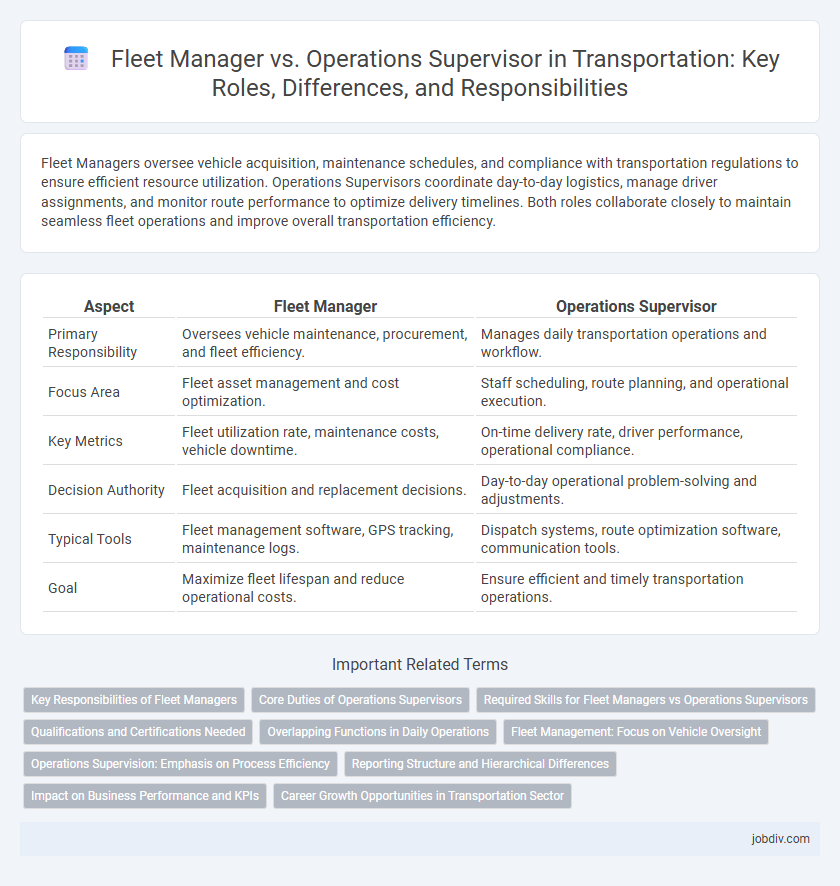Fleet Managers oversee vehicle acquisition, maintenance schedules, and compliance with transportation regulations to ensure efficient resource utilization. Operations Supervisors coordinate day-to-day logistics, manage driver assignments, and monitor route performance to optimize delivery timelines. Both roles collaborate closely to maintain seamless fleet operations and improve overall transportation efficiency.
Table of Comparison
| Aspect | Fleet Manager | Operations Supervisor |
|---|---|---|
| Primary Responsibility | Oversees vehicle maintenance, procurement, and fleet efficiency. | Manages daily transportation operations and workflow. |
| Focus Area | Fleet asset management and cost optimization. | Staff scheduling, route planning, and operational execution. |
| Key Metrics | Fleet utilization rate, maintenance costs, vehicle downtime. | On-time delivery rate, driver performance, operational compliance. |
| Decision Authority | Fleet acquisition and replacement decisions. | Day-to-day operational problem-solving and adjustments. |
| Typical Tools | Fleet management software, GPS tracking, maintenance logs. | Dispatch systems, route optimization software, communication tools. |
| Goal | Maximize fleet lifespan and reduce operational costs. | Ensure efficient and timely transportation operations. |
Key Responsibilities of Fleet Managers
Fleet Managers oversee the acquisition, maintenance, and lifecycle management of company vehicles to ensure operational efficiency and cost control. They coordinate vehicle scheduling, monitor driver compliance with safety regulations, and analyze fleet performance metrics to optimize routes and reduce downtime. Their role encompasses budgeting for repairs and fuel, negotiating with vendors, and implementing technology solutions like telematics to enhance fleet management.
Core Duties of Operations Supervisors
Operations Supervisvisors in transportation oversee daily activities to ensure efficient fleet performance, including coordinating driver schedules, monitoring vehicle maintenance, and enforcing safety protocols. They manage real-time operational issues, handle route planning adjustments, and ensure compliance with transportation regulations. Their core duties directly impact service reliability, cost control, and regulatory adherence within fleet operations.
Required Skills for Fleet Managers vs Operations Supervisors
Fleet Managers require strong skills in vehicle maintenance planning, route optimization, and compliance with transportation regulations, ensuring cost-effective fleet performance. Operations Supervisors need expertise in team leadership, workflow coordination, and real-time problem solving to maintain efficient daily operations. Both roles demand proficiency in data analysis and communication, with Fleet Managers emphasizing strategic asset management while Supervisors focus on operational execution.
Qualifications and Certifications Needed
Fleet Managers typically require a bachelor's degree in logistics, business administration, or supply chain management, along with certifications such as Certified Transportation Professional (CTP) or Certified Logistics Manager (CLM). Operations Supervisors often need experience in team leadership and may hold certifications like OSHA Safety Training or Six Sigma for process improvement. Both roles benefit from strong knowledge of transportation regulations, safety standards, and fleet management software proficiency.
Overlapping Functions in Daily Operations
Fleet managers and operations supervisors both play critical roles in transportation management, often sharing responsibilities such as coordinating vehicle maintenance schedules, monitoring driver performance, and ensuring compliance with safety regulations. Their overlapping functions include managing logistics to optimize route efficiency, handling incident reports, and maintaining communication with drivers and stakeholders to support smooth daily operations. Effective collaboration between the two positions enhances operational efficiency, reduces downtime, and improves fleet utilization rates.
Fleet Management: Focus on Vehicle Oversight
Fleet Managers specialize in vehicle oversight by coordinating maintenance schedules, monitoring fuel efficiency, and ensuring regulatory compliance to maximize fleet performance. Operations Supervisors support these efforts by managing daily logistical activities and driver assignments but lack the specialized expertise in vehicle lifecycle management. Effective fleet management relies on the Fleet Manager's detailed analysis of vehicle data and strategic planning to reduce downtime and operational costs.
Operations Supervision: Emphasis on Process Efficiency
Operations Supervisvisors prioritize process efficiency by implementing standardized workflows, monitoring key performance indicators, and optimizing resource allocation to minimize delays and reduce operational costs. They coordinate closely with dispatch teams and maintenance departments to ensure seamless vehicle utilization and compliance with safety regulations. Leveraging real-time data analytics, Operations Supervisors swiftly identify bottlenecks and adjust schedules to uphold service reliability within transportation fleets.
Reporting Structure and Hierarchical Differences
A Fleet Manager typically oversees vehicle maintenance and logistics, reporting directly to senior management or the transportation director, whereas an Operations Supervisor manages daily staff activities and coordinates schedules, reporting to the Fleet Manager or operations manager. The Fleet Manager holds a higher hierarchical position with broader strategic responsibilities, while the Operations Supervisor focuses on operational execution and team supervision. This hierarchical distinction ensures effective communication flow and accountability within transportation management systems.
Impact on Business Performance and KPIs
Fleet Managers drive better business performance by optimizing vehicle utilization, reducing maintenance costs, and ensuring regulatory compliance, directly improving KPIs such as fleet uptime, fuel efficiency, and cost per mile. Operations Supervisors enhance operational efficiency through staff coordination, workflow management, and real-time issue resolution, boosting KPIs like on-time delivery rates, workforce productivity, and customer satisfaction scores. Both roles are critical for maximizing profitability and operational excellence in transportation management.
Career Growth Opportunities in Transportation Sector
Fleet Managers typically have broader career growth opportunities in the transportation sector due to their responsibility for entire vehicle fleets, including maintenance, compliance, and cost management. Operations Supervisors often specialize in overseeing daily transportation activities and staff, providing a pathway to roles in logistics coordination or supply chain management. Advancement for Fleet Managers can lead to senior roles such as Transportation Director or Logistics Manager, emphasizing strategic fleet optimization and operational efficiency.
Fleet Manager vs Operations Supervisor Infographic

 jobdiv.com
jobdiv.com